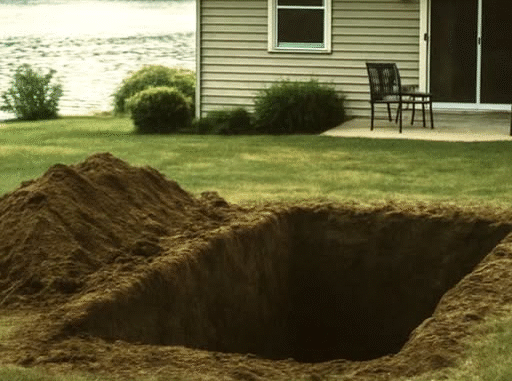
My husband told me he was heading out of town for a short work trip. I kissed him goodbye like I always did, trusting his words. But less than 24 hours later, I stood frozen in the backyard of our lake house, watching him dig a massive hole in the earth — a grave-sized hole — and shouting at me not to come any closer. That’s when everything began to unravel.
Adam and I met 12 years ago during a rainstorm. He ducked into my tiny coffee shop, soaked to the bone, mumbling something about needing Wi-Fi for “code deployment.” I didn’t know what that meant, but I served him the strongest cappuccino I could make. That was the beginning.
He kept showing up. First every Tuesday, then every day — until one day, he simply never left.
We built a life together. Two kids, two coffee shops, and a chaotic but happy home. Adam also worked in tech — something with startups I could never fully explain.
Three years ago, we inherited a creaky old house on Millfield Lake from his father. It became our sacred escape — uneven floors, stubborn windows, but priceless sunsets. It was our peace.
So when Adam said he had to travel to Portland for a conference, I didn’t think twice. He left Friday morning, briefcase in hand, suit crisp, kiss on the cheek.
But by Saturday, the weather was too perfect to waste. I loaded up the kids and surprised them with a spontaneous lake trip.
We pulled into the driveway — and there it was. Adam’s car, parked under the trees. The same car I watched drive away the day before.
Alarm bells rang.
I told the kids to stay put. I approached the house slowly. The front door was open, a coffee mug still warm on the table, yesterday’s paper neatly folded. And then, through the kitchen window, I saw it — a massive pit carved into the earth, with a shovel planted upright in the dirt like a gravestone.
I stepped outside, heart pounding.
“Adam?” I called.
From inside the pit, a rustle. Then, Adam’s head appeared, smeared with dirt, eyes wide with panic.
“Mia?! You weren’t supposed to be here!”
“I could say the same to you,” I shot back. “What are you doing?”
“Please. Don’t come closer,” he said, shovel clutched in his hands, voice shaking.
But I did. I walked right up to that hole and looked in. What I saw took my breath away.
Bones. Old, brittle, and wrapped in decaying fabric. A skull, still grinning through the dirt.
I recoiled. “Oh my God. Adam… what did you do?”
“I didn’t kill anyone,” he said quickly, dropping the shovel. “Please, listen to me.”
The truth, it turned out, was buried far deeper than just a body.
Adam explained that his father, now living in a memory care facility, had recently blurted out something strange — that when he was a boy, he watched his own grandmother bury someone in their yard. A secret he’d kept for decades.
That someone? Adam’s great-grandfather — Samuel. A man shunned by the community and denied burial in the town cemetery due to an affair with a married woman.
His grandmother, devastated and defiant, buried him on their land, near the lake he loved, in secret. She left behind letters, hidden away for years, one of which Adam had found confirming the story. Still, he hadn’t known if it was real — not until he started digging.
He lied about Portland because he didn’t want to worry me. He wanted to handle it quietly. Alone.
But now the truth was out — not just to me, but soon, to the world.
Three weeks later, with help from local historians and authorities, we gave Samuel the burial he deserved. A proper headstone, a proper ceremony. The truth brought to light after nearly a century of silence.
Samuel was no villain. He was a man punished for loving the wrong person at the wrong time.
Now, he rests beside her.
And as we walked away from the cemetery, our children in hand, I realized something: some secrets are buried deep. But when they finally surface, they don’t destroy — they heal.
Because love — even when hidden for years — always finds a way to be seen.